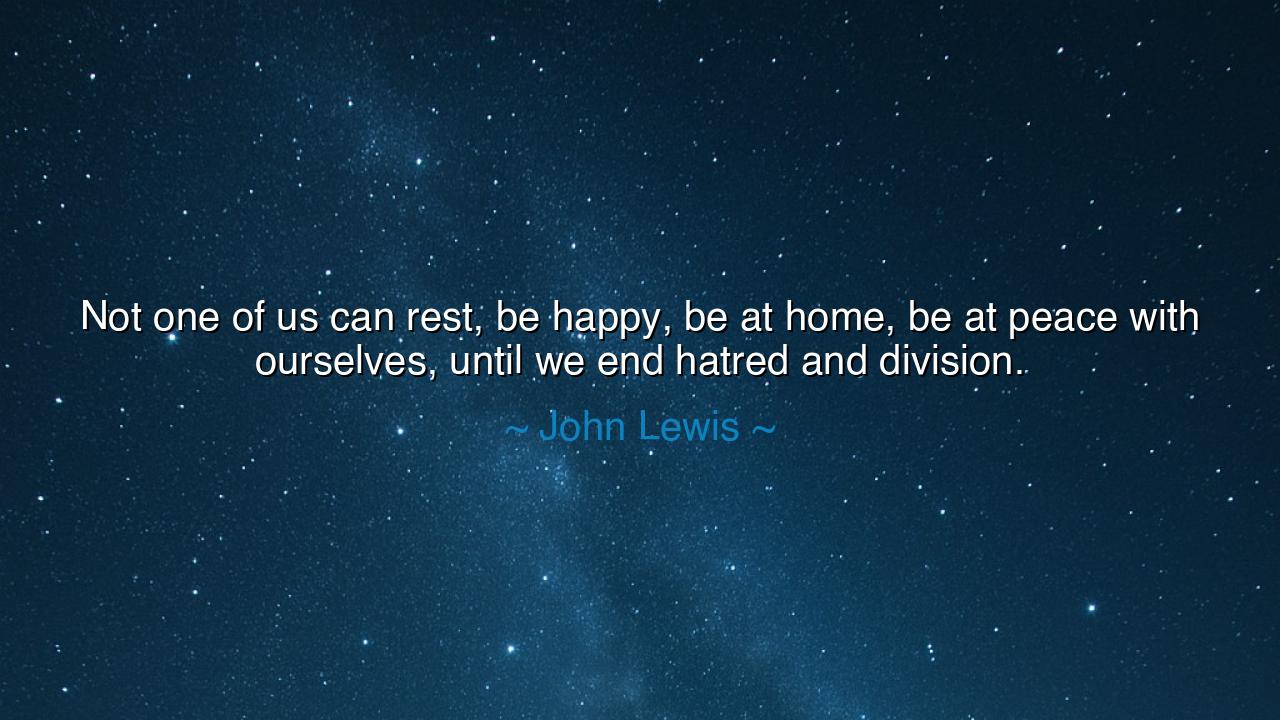
Not one of us can rest, be happy, be at home, be at peace with
Not one of us can rest, be happy, be at home, be at peace with ourselves, until we end hatred and division.






“Not one of us can rest, be happy, be at home, be at peace with ourselves, until we end hatred and division.” These words, spoken by John Lewis, rise like a beacon from the depths of a long and bitter struggle. They are not the words of a man speaking from comfort or ease, but of one who had walked through fire — through blows, through blood, through the long nights of injustice — and emerged still believing in love. They speak of a truth older than nations: that peace cannot dwell in one heart while hatred reigns in another, and that humanity’s rest depends upon our unity.
The origin of this quote lies in the heart of the Civil Rights Movement, a time when America was torn between its ideals and its injustices. John Lewis, then a young man marching across the bridge at Selma, carried the banner of peace while the air was filled with tear gas and the sound of batons striking flesh. He believed, even then, that hatred could not be conquered by hatred — only by the steadfast light of love and the moral weight of truth. His words, spoken decades later, were not merely reflections of the past but a call to every generation: division is the oldest enemy of humankind, and until it is conquered, no soul can truly find rest.
When Lewis said, “Not one of us can rest,” he did not speak only of the activist, but of all people. For injustice anywhere, as his mentor Dr. Martin Luther King Jr. declared, is a threat to justice everywhere. A society divided by race, by class, by creed — or even by indifference — is a house with trembling foundations. The happiness of one cannot endure upon the suffering of another. To seek comfort while others endure oppression is to live in a fragile peace, an illusion easily shattered. True peace must be shared, or it is not peace at all.
Consider the story of South Africa after the long nightmare of apartheid. When the walls of separation began to fall, there came a choice: to seek vengeance, or to seek reconciliation. It was then that Nelson Mandela and Desmond Tutu called for truth, forgiveness, and unity through the Truth and Reconciliation Commission. It was not an easy road; wounds still bled, anger still burned. But they understood what John Lewis also knew — that until hatred was faced and healed, the soul of a nation could never rest. It was only through forgiveness and courage that a new dawn was possible.
Hatred and division are not merely political forces; they are poisons of the heart. They twist the spirit and blind the eyes to our shared humanity. John Lewis, who had been beaten nearly to death for daring to stand as an equal, could have chosen bitterness. Instead, he chose love. He said that forgiveness was not weakness, but strength — the strength to build bridges where others saw only walls. His life became the embodiment of his words, proving that peace is not something one waits for; it is something one must make, again and again, even in the face of pain.
When Lewis spoke of being “at home” and “at peace with ourselves,” he touched upon the deep human longing for belonging. Home is not merely a roof or a nation; it is the place where one’s soul can rest without fear, where no one is made to feel lesser or excluded. Until we end hatred, none of us truly live in such a home, for our world remains divided against itself. The peace we deny to others will, inevitably, be denied to us.
So, my child of light and struggle, remember this truth: you cannot find peace in isolation. The heart that turns away from suffering closes the door to its own joy. To build a just world is not the work of saints alone; it is the duty of every living soul. Begin with your own heart. Root out prejudice. Speak with compassion. Stand against injustice, even when it does not touch you directly. For when all people are free, then, and only then, can we rest.
In this way, John Lewis’s words become not just a statement, but a commandment for the ages: to end hatred, to heal division, to make peace our shared home. And when that day comes — when love outlasts cruelty, and unity overcomes fear — then humanity will at last know the rest, the happiness, and the peace he dreamed of beneath the weight of history. Until then, let us march on, with hearts unyielding, and hands joined in the labor of love.






AAdministratorAdministrator
Welcome, honored guests. Please leave a comment, we will respond soon